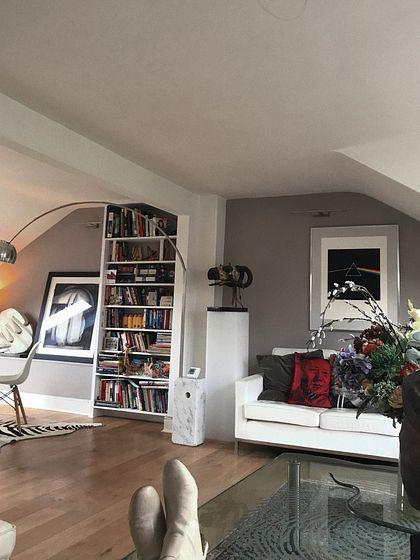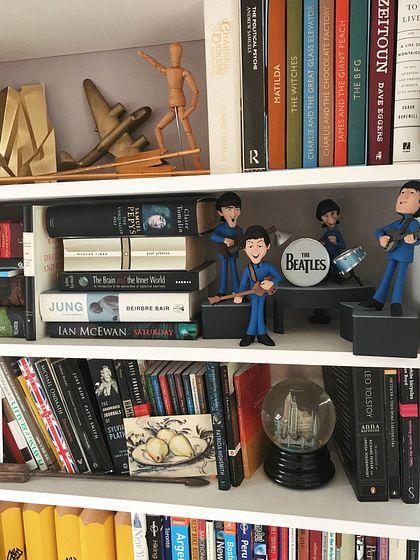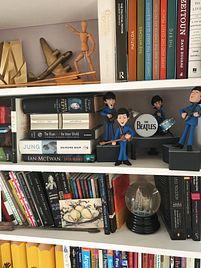But you don’t know how to feed yourself and you hate being alone,” said my sister. I had just told her about my decision to spend the month of January sequestered in our parents’ empty flat in London, the city in which I grew up but hadn’t lived since moving to New York at 14.
Homecoming Queen
With distractions left behind her in New York, Coco Mellors began a month of solitude in London to finish her novel, and cure herself of bad love...
By Coco Mellors
Her claim was only partly true. I did, indeed, at that time consider a Dairy Milk and a Diet Coke to be a balanced breakfast, but I loved being alone. I just liked to bookend my solitude with bouts of frenzied social activity and a work schedule as a copywriter so overwhelming my heart palpitated.
I was 28, two years sober, and three years into writing a book that may not have been any good. I was also dating my next door neighbour in New York, a 35-year-old restaurant owner who didn’t believe in monogamy and was never available. Before Christmas, I had made the cardinal mistake of telling him I loved him, a declaration he… well, straight-up ignored. In fact, he nodded once, turned over, and went to sleep.
So, instead of returning to New York after spending the festive season in England, I decided to sublet my studio, gather my meagre savings, and stay put in my parents’ place in Hampstead (they were visiting family elsewhere for the month). For me, New York says: busy yourself; Paris says: indulge yourself; London says: face yourself.




For 30 days I would do two things: attempt to finish my novel by writing every day, and attempt to fall out of love by not calling my neighbour.
Telling people you’re writing a novel is, I imagine, a little like telling people you’re pregnant; first comes the delight, then come the intrusive questions. “That’s so exciting! So... What’s it about? Who’s your agent? Your publisher? How many words do you write a day?” Most of the time I felt so silly and fraudulent even saying I was a writer. I didn’t have an agent or a publisher. I didn’t even have a robust writing practice I could brag about. I just tried to get it done when I could, squeezing caffeine-fuelled hours of writing into my weekends and evenings when I wasn’t too tired from my regular work.
There is a quote in Jonathan Franzen’s novel Freedom that I love: “There is, after all, a kind of happiness in unhappiness, if it's the right unhappiness.” I often found myself, during those 30 days, feeling steeped in loneliness, but what I now think of as the right loneliness. Most of my adult memories in London were marred by drinking; I spent my visits home falling in and out of pubs and Ubers and beds, feeling alone no matter how many people I surrounded myself with. Now I found myself actually alone, but there was a sweetness to it that surprised me.
For the first time, I noticed the delicate, star-shaped Christmas lights strung above the high street, how they dropped bright lozenges into the puddles below. After finishing a particularly difficult chapter, I celebrated by taking myself to M&S and buying a Colin the Caterpillar cake, which I ate in bed while watching Peep Show. I did silly things to entertain myself, like seeing how many books I could balance on my head before they toppled off. (With such amusements, who needs Instagram?)
Because I drank through much of my adolescence and early 20s, I’d spent a lot of my life until that point pretending to know who I was, but not much time really finding out. My biggest fear during my month alone was discovering that I really did hate being by myself or, worse, that I didn’t want to be a writer after all. But I found that I loved both the solitude and the work. Day after day, I lived a life similar to a Jane Austen character. I wrote floridly by hand. I strolled on the Heath. I thought longingly of a man who was a mystery to me. I ruminated.
There was, however, one regular break in my isolation. Every few days I would walk to the high street and ascend to a warm little room above the secondhand bookshop filled with other people who, like me, had realised they could no longer drink alcohol safely, and would meet to talk about it. I spent a lot of time in those meetings crying (that was another of my daily activities, though not an Austenian one, as her characters never cry). In New York, I had busied myself in order not to face myself. In London, I finally had the time and space to have a good look.
That was a time of wanting so much – too much, I feared. I wanted to spend my days doing work I cared about. I wanted to write something beautiful and, more than that, have people other than my mother think it was beautiful too. I wanted to love someone who would do more than nod (nod!) when I told him how I felt. I wanted, somehow, to do all of this without drinking.
My favourite person at these meetings was a retired theatre actor called June, who listened to my litany of wants without judgement.
“You just have to remember that you’re a miracle,” she’d say every time.
Sometimes I’d see June pottering around the high street, usually covered in crumbs from whatever croissant or pastry from Paul she had just consumed, and she’d always stop and wave. “Hello, miracle,” she’d say, and even though I suspected she only called me this because she couldn’t remember my name, it felt good to hear.
So good, in fact, that I started my first ever daily writing ritual during those weeks. Each morning when I sat down to write, before my head had a chance to start playing its usual soundtrack of self-doubt, I would put on Hot Chocolate’s You Sexy Thing. Anyone who watched The Full Monty growing up will surely remember the song’s opening lines: “I believe in miracles. Where you from? You sexy thing… ”This song became my morning meditation, my pump-up jam, my personal mantra. I’d play it once all the way through, have a little groove, then get to work.
At the end of the 30 days, I had kept my promise to myself: I had written, I had not called. On my final walk on the Heath, I looked out across the bright, muddy hills and wondered what came next.
I would end up calling my neighbour again. I would spend two more years working on that novel. It would get rejected. A lot. But that summer I would meet a man, the best man I’d ever met in fact, and the following year I would marry him. I would feel lonely in new and unexpected ways, but never in that exact way again. I would keep writing. And, eventually, that novel would get published by two of my dream publishers. I couldn’t know any of this then, of course, but as I walked, I had a good feeling. I believed in miracles.
Names have been changed.
Coco Mellors’ debut novel Cleopatra and Frankenstein, about an impulsive marriage for American citizenship gone awry, will be published by 4th Estate in early 2022
Lead image courtesy of: Coco Mellors
The Short Stack
Sometimes bringing it all back home can give you the focus you need to move forward.
By Coco Mellors
